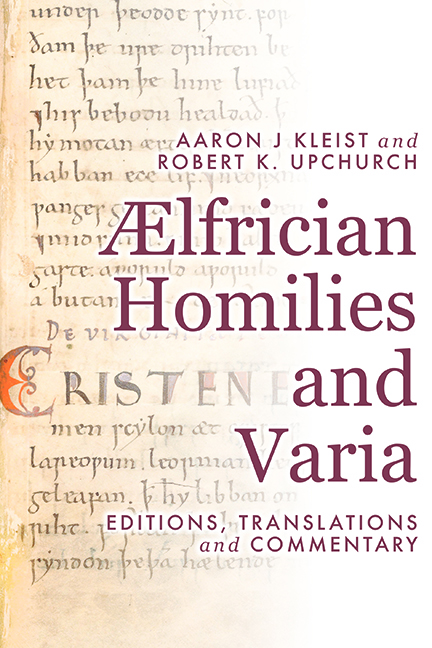Book contents
- Frontmatter
- Contents
- Preface
- Acknowledgements
- Abbreviations
- Sigla for Cited Ælfrician Manuscripts
- Dates for Cited Ælfrician Works
- Editorial Conventions
- Conventions Used in the Commentaries
- Homilies The Proper of the Season
- Homilies The Proper of the Saints
- Ælfrician Homilies and Varia: Editions, Translations, and Commentary: Volume II
- Homilies The Common of the Saints
- Homilies Unspecified Occasions
- Varia
- Works Cited
- Index
- ANGLO-SAXON TEXTS
16 - De septiformi spiritu (‘Concerning the Sevenfold Spirit’)
Published online by Cambridge University Press: 05 March 2024
- Frontmatter
- Contents
- Preface
- Acknowledgements
- Abbreviations
- Sigla for Cited Ælfrician Manuscripts
- Dates for Cited Ælfrician Works
- Editorial Conventions
- Conventions Used in the Commentaries
- Homilies The Proper of the Season
- Homilies The Proper of the Saints
- Ælfrician Homilies and Varia: Editions, Translations, and Commentary: Volume II
- Homilies The Common of the Saints
- Homilies Unspecified Occasions
- Varia
- Works Cited
- Index
- ANGLO-SAXON TEXTS
Summary
De septiformi spiritu (‘Concerning the Sevenfold Spirit’) is Ælfric's Latin tract on the sevenfold ‘spirits’ or attributes of the Holy Spirit and of the evil spirit, the devil. In this brief work, each spiritus bonus (‘good spirit’) is paired with its opposing spiritus malus (‘wicked spirit’) and another worse spirit. A spirit of wisdom, for example, is contrary to foolishness and the pretense of wisdom, and a spirit of discernment contrary to stupidity and the pretense of learning. Likewise, the good spirits of, deliberation, courage, knowledge, piety, and the fear of God are opposed by their wicked and worse counterparts. The tract's opening sentence mentions Isaiah from whose book of prophesy the idea of the sevenfold spirit ultimately derives. But Ælfric's more immediate source was a commentary on the book of Revelation, the Commentarius in Apocalypsin, by Primasius, a mid-sixth-century bishop of Hadrumetum in Africa (today Sousse, Tunisia). The one copy of the Commentarius known to have existed in Anglo-Saxon England was annotated by Dunstan (d. 988), the archbishop of Canterbury, who along with Æthelwold, bishop of Winchester (d. 984), and Oswald, bishop of Worcester and archbishop of York (d. 992), led the ecclesiastical reform of which Ælfric was a product. Dunstan probably annotated the Commentarius when he was abbot of Glastonbury (ca 940–57), the same time Æthelwold, Ælfric's teacher, was Dunstan's student there. Ælfric thus might have learned of Primasius’ commentary from Æthelwold and consulted it in some form during his studies at Winchester. For De septiformi spiritu, Ælfric hews very closely to Primasius’ text and then expands on his adaptation in the vernacular Be þam Halgan Gaste (‘Concerning the Holy Spirit’ [AH II.17]). He wrote both tracts between about 998 and 1002, perhaps as a single work and probably for Wulfstan (d. 1023) who was bishop of London at the beginning of this period and archbishop of York at its end. Wulfstan lightly revised Be þam Halgan Gaste for a homily of his own but left De septiformi spiritu unchanged. Ælfric for his part seems to have had both tracts copied into a Commonplace Book that no longer survives.
- Type
- Chapter
- Information
- Ælfrician Homilies and VariaEditions, Translations, and Commentary, pp. 787 - 802Publisher: Boydell & BrewerPrint publication year: 2022

